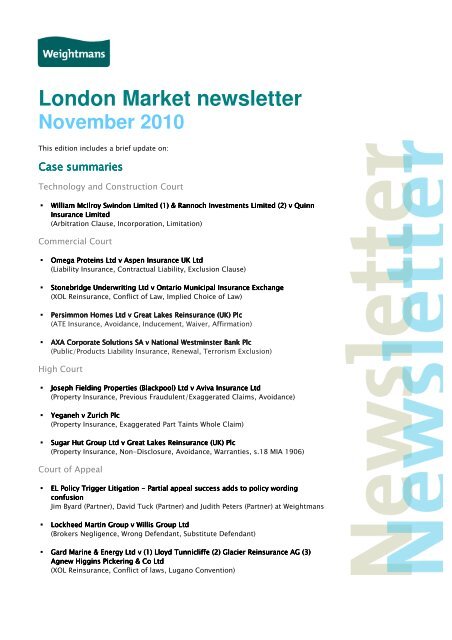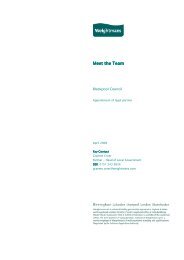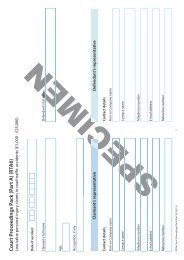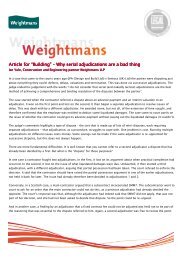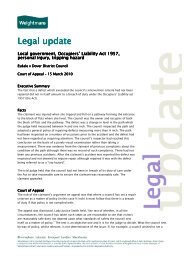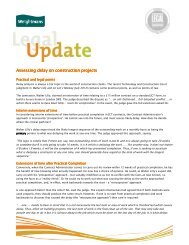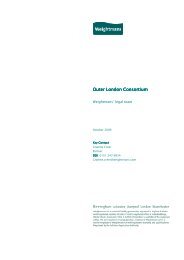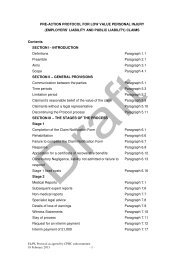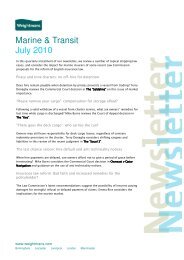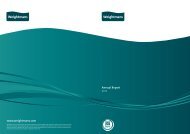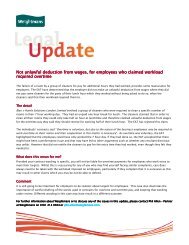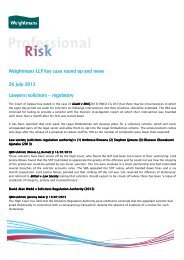London Market newsletter - Weightmans Solicitors
London Market newsletter - Weightmans Solicitors
London Market newsletter - Weightmans Solicitors
You also want an ePaper? Increase the reach of your titles
YUMPU automatically turns print PDFs into web optimized ePapers that Google loves.
<strong>London</strong> <strong>Market</strong> <strong>newsletter</strong><br />
November 2010<br />
This edition includes a brief update on:<br />
Case summaries<br />
Technology and Construction Court<br />
<br />
William McIlroy Swindon Limited (1) & Rannoch Investments Limited (2) v Quinn<br />
Insurance Limited<br />
(Arbitration Clause, Incorporation, Limitation)<br />
Commercial Court<br />
<br />
<br />
<br />
<br />
Omega Proteins Ltd v Aspen Insurance UK Ltd<br />
(Liability Insurance, Contractual Liability, Exclusion Clause)<br />
Stonebridge Underwriting Ltd v Ontario Municipal Insurance Exchange<br />
(XOL Reinsurance, Conflict of Law, Implied Choice of Law)<br />
Persimmon Homes Ltd v Great Lakes Reinsurance (UK) Plc<br />
(ATE Insurance, Avoidance, Inducement, Waiver, Affirmation)<br />
AXA Corporate Solutions SA v National Westminster Bank Plc<br />
(Public/Products Liability Insurance, Renewal, Terrorism Exclusion)<br />
High Court<br />
<br />
<br />
<br />
Joseph Fielding Properties (Blackpool) Ltd v Aviva Insurance Ltd<br />
(Property Insurance, Previous Fraudulent/Exaggerated Claims, Avoidance)<br />
Yeganeh v Zurich Plc<br />
(Property Insurance, Exaggerated Part Taints Whole Claim)<br />
Sugar Hut t Group Ltd v Great Lakes Reinsurance (UK) Plc<br />
(Property Insurance, Non-Disclosure, Avoidance, Warranties, s.18 MIA 1906)<br />
Court of Appeal<br />
<br />
<br />
EL Policy Trigger Litigation - Partial appeal success adds to policy wording<br />
confusion<br />
Jim Byard (Partner), David Tuck (Partner) and Judith Peters (Partner) at <strong>Weightmans</strong><br />
Lockheed Martin Group v Willis Group Ltd<br />
(Brokers Negligence, Wrong Defendant, Substitute Defendant)<br />
Gard Marine & Energy Ltd v (1) Lloyd Tunnicliffe (2) Glacier Reinsurance AG (3)<br />
Agnew Higgins Pickering & Co Ltd<br />
(XOL Reinsurance, Conflict of laws, Lugano Convention)
Guest article<br />
Enforcement of a UK Arbitration Award in Israel against a company not named in the Award<br />
Peggy Sharon (Senior Partner), Irit Shapira Webber (Joint Venture Partner) and Deror Lin (Senior Associate) at<br />
Levitan, Sharon & Co.<br />
Catch up<br />
<strong>Market</strong> events where you will be able to catch up with members of our <strong>London</strong> <strong>Market</strong> team.
Arbitration Clause, Incorporation, Limitation<br />
William McIlroy Swindon Limited (1) & Rannoch Investments Limited (2) v Quinn Insurance Limited [2010]<br />
EWHC 2448 (TCC)<br />
At a trial of preliminary issues, the Technology & Construction Court upheld the application of an arbitration<br />
clause in an insurance policy which required that any dispute between insurers and insured has to be referred to<br />
arbitration within nine months, failing which the claim was deemed abandoned.<br />
Quinn provided public liability cover to Lenihan. In earlier judgments in separate proceedings, Lenihan<br />
were held liable to the claimants for a fire which occurred on 5 September 2006. The amount of damages<br />
payable was assessed on 11 December 2009 and 13 January 2010 respectively for the two claimants.<br />
Lenihan went into voluntary liquidation shortly afterwards and the claimants issued proceedings against<br />
Quinn under the Third Parties (Rights Against Insurers) Act 1930.<br />
Liability under the policy for any claim arising from the fire was denied by Quinn on grounds of breach of<br />
policy terms and conditions. In addition, Quinn argued that because there had been no reference to<br />
arbitration within the time required under the arbitration clause, any claim under the policy was deemed to<br />
be abandoned and was not recoverable.<br />
The main issues before the Court were:<br />
1. Whether the arbitration clause excluded the right to pursue a claim by litigation<br />
2. Whether the arbitration clause was incorporated into the policy<br />
3. Whether the time for referring the matter to arbitration had expired<br />
Edwards-Stuart J held:<br />
1. On a proper construction of the clause, the wording was clear and prescribed a mandatory mode of<br />
dispute resolution. The language made it “abundantly clear” that the clause was intended to provide<br />
an exclusive remedy.<br />
2. The arbitration clause was contained in an “off-the-shelf” policy. It was not written specifically for<br />
Lenihan nor Lenihan’s type of business.<br />
The judge rejected argument that the arbitration clause was not incorporated for the following four<br />
reasons:<br />
a. The insured had the policy wording in their possession for two years prior to the inception of the<br />
policy year in question (i.e. the 2006/2007 policy year). They had the opportunity of studying the<br />
policy terms and this was not a case of incorporation by reference.<br />
b. Quinn’s covering letters sending the policy documents specifically asked the insured to read the policy<br />
carefully to ensure that it met with the insured’s particular needs.<br />
c. The insurance was arranged through brokers who could be expected to be familiar with Quinn’s<br />
standard form of policy and to give relevant advice to Lenihan. The brokers should have been aware in<br />
general terms of any unusual terms on Quinn’s policy and advised Lenihan accordingly.<br />
d. The provisions of the arbitration clause were not unduly onerous. A requirement to resolve disputes<br />
by arbitration cannot be regarded as onerous just because it is unusual and possibly inconvenient.
The nine month time limit is shorter than the statutory six year limitation period but that does not<br />
make it onerous.<br />
Both Lenihan and the brokers were aware of Quinn’s refusal to indemnify by February 2009. The judge<br />
expected them to look at the policy for the provisions which Quinn had relied on. He said also, that the<br />
brokers at least, if not Lenihan also, should have looked at the policy to see what provisions there were for<br />
dispute resolution; there was no shortage of time within which to do this.<br />
In reaching the above finding, the judge commented that, with one possible exception, insurers are not<br />
required to draw to the insured’s attention every term in an insurance policy that might prove onerous.<br />
The only exception identified is that of terms concerning claim notification.<br />
1. It was common ground that the arbitration clause referred to a dispute in respect of a claim by<br />
the insured under the policy, as opposed to a claim by a third party against the insured.<br />
However, there was an issue as to when such a dispute arose.<br />
The claimants argued, by reference to Post Office v Norwich Union [1967], that insurers had no liability to<br />
the insured until the insured’s liability to the third party had been determined and quantified and as such,<br />
the earliest date the dispute could arise was when Lenihan’s liability was established and ascertained by<br />
orders of 11 December 2009 and 13 January 2010. On this basis, the nine month limit had not expired.<br />
The judge held that where insurers have notified an insured that indemnity would not be granted and the<br />
refusal to indemnify is unjustified, then insurers are in breach of contract. It follows that once Lenihan had<br />
notified Quinn of a claim under the policy of a potential liability to a third party and Quinn had notified<br />
Lenihan that they were refusing indemnity, then there was a dispute between Quinn and Lenihan within the<br />
meaning of the arbitration clause.<br />
The judge commented that the Post Office case did not prevent an insured from seeking declaratory relief<br />
where it is alleged that insurers are in breach.<br />
On the facts, the judge found that the dispute between Quinn and Lenihan arose at latest by end of<br />
February 2009 and any arbitration had to be commenced by the end of November 2009.<br />
The claimants had also sought to rely on paragraph 2.5.3 of the Insurance Conduct of Business Sourcebook<br />
(“ICOB”) which stated that “A firm must not in any written or oral communication to a customer seek to<br />
exclude or restrict, or rely on any exclusion or restriction of, any duty or liability … unless it is reasonable<br />
for it to do so”. The judge decided that Quinn were not under any obligation to advise Lenihan of the<br />
existence of the nine month time limit in a policy that Lenihan have had for some years; and that Quinn<br />
had acted within their rights and reasonably in relying on the arbitration clause.<br />
Leave for permission to appeal has been given for point 3 above but refused for points 1 and 2.<br />
Quinn Insurance Limited were represented in these proceedings by Ling Ong, partner in the <strong>London</strong> <strong>Market</strong><br />
Insurance & Reinsurance Team at <strong>Weightmans</strong>.<br />
Please refer any queries to Ling on +44 (0) 20 78221985 or ling.ong@weightmans.com.
Liability Insurance, Contractual Liability, Exclusion Clause<br />
Omega Proteins Ltd v Aspen Insurance UK Ltd [2010] EWCH 2280 (Comm)<br />
Where a liability insurance policy contained an exclusion of any liability arising under a contract, unless<br />
such liability would have attached in the absence of the contract, a judgment that the insured was liable for<br />
breach of contract did not prevent the insured from showing that there would also have been tortious<br />
liability.<br />
Omega Proteins Limited (Omega) conducts business processing by-products from animal carcasses used in<br />
the meat industry which it then supplies to pet food manufacturers. Northern Counties supplied Omega<br />
with contaminated animal carcasses which Omega, unaware of the contamination, supplied to JG Pears.<br />
Omega became liable to pay damages to Pears for breach of contract and Northern Counties was held<br />
contractually liable to indemnify Omega for that liability. Northern Counties went into liquidation.<br />
Aspen provided Northern Counties with insurance under a combined liability insurance policy. As Northern<br />
Counties was in liquidation, Omega claimed against Aspen under the Third Parties (Rights Against Insurers)<br />
Act 1930.<br />
The insurance policy contained an exclusion in respect of any liability arising under any contract or<br />
agreement unless such liability would have attached to Northern Counties in the absence of such contract<br />
or agreement.<br />
Aspen submitted that Omega could not bring a claim against them as insurers on the basis of the earlier<br />
judgment because it conclusively determined that the liability of Northern Counties was in contract and did<br />
not find liability on any other basis.<br />
Held:<br />
The earlier judgment did not preclude the Court from considering what liability there would have been in<br />
the absence of the contract between Northern Counties and Omega had the facts of the case remained the<br />
same in every other respect.<br />
Northern Counties, as part of its duty of care, ought to have kept itself up to date on what constituted<br />
contaminated matter and would therefore have been liable in negligence had there been no contract.<br />
Northern Counties would have been liable in tort for allowing material to be supplied that was only fit for<br />
disposal without warning, an action that could foreseeably cause damage to Omega.<br />
As to the liability of the Aspen, the insured had to establish loss had been suffered which was caused by a<br />
peril which came within the scope of the policy (West Wake Price & Co v Ching [1975]). The previous<br />
judgment established that Northern Counties had suffered a loss, but it was open to either party to show<br />
what the cause of the loss was. Aspen were at liberty to show the loss was not an insured loss or fell within<br />
an exception (MDIS Ltd v Swinbank [1999]).<br />
In this case Aspen failed to show there would have been no liability on their insured, Northern Counties, in<br />
negligence, and therefore failed to bring itself within the relevant clause. Omega was entitled to be<br />
indemnified by Aspen.
XOL Rei<br />
einsurance, Conflict of Law, Implied Choice of Law<br />
Stonebridge Underwriting ng Ltd v Ontario Municipal Insurance Exchange [2010] EWHC 2279 (Comm)<br />
OMEX is a Canadian not-for-profit insurance exchange which insures various municipalities in Ontario. Jardine<br />
Lloyd Tompson Canada Inc. (JLT Canada) arranged Excess of Loss reinsurance cover for two of the risk pools in<br />
the OMEX programme.<br />
The reinsurance cover was obtained from the <strong>London</strong> market and obtained by JLT <strong>London</strong>. The XOL reinsurance<br />
policy was on a Lloyd’s slip brokered through a Lloyd’s broker with Lloyd’s Syndicate 990 for the 2001 and 2002<br />
years of account. The contract itself used Lloyd’s market clauses. There was no express choice of law.<br />
The dispute concerned the refusal of the reinsurer Stonebridge (now XL <strong>London</strong> <strong>Market</strong> Ltd) to pay sums OMEX<br />
alleged were due. Stonebridge denied cover on the basis of its interpretation of the annual aggregate deductible<br />
provisions and also because of breach of the claims notification clause which it maintained was a condition<br />
precedent.<br />
OMEX commenced proceedings in Ontario claiming damages, and asserted that the contract was governed by<br />
Ontario law. Stonebridge brought proceedings in England for negative declaratory relief. OMEX applied for an<br />
order to set aside service of the English proceedings on it on the grounds that England was not the proper<br />
jurisdiction for the case between the parties to be heard.<br />
Christopher Clarke J held:<br />
1. Stonebridge had a much better argument in saying that the parties to the reinsurance contract had impliedly<br />
chosen English law given that the policy was on a Lloyd’s slip, and the contract referred to Lloyd’s market<br />
clauses.<br />
2. The fact the parties had impliedly chosen English law was of considerable significance for a number of<br />
reasons:<br />
a. The only choice of alternative venue may deprive Stonebridge of the benefit of English law;<br />
b. The chief subject matter in dispute, the proper construction of the excess/deductible provisions, is<br />
particularly suited to the English Court as it has considerable experience and expertise in reinsurance<br />
matters particularly those concerning Lloyd’s;<br />
c. Evidence as to the facts and matters which ought to have been known to the parties is likely to be<br />
located in <strong>London</strong> where the underwriters and placing brokers are located.<br />
3. The same decision would have been reached had it been concluded that English law was likely to be the<br />
applicable law only because England was the place of characteristic performance because of the disadvantage<br />
of Stonebridge running the risk that the Ontario Court would apply a different law thereby denying<br />
Stonebridge of a defence otherwise available to it under English law.<br />
4. The fact OMEX was the first to commence proceedings, in Ontario, held little weight as jurisdiction had not<br />
been determined and English proceedings were further advanced.<br />
5. The issue of proceedings by OMEX against JLT Canada, for breaches of the insurance brokerage contract, had<br />
not been ignored but it would be open to OMEX to join JLT Canada as a proper party to the English<br />
proceedings. Even if the two proceedings continued in tandem, it was not considered that overlap would be<br />
great.<br />
6. There was nothing sufficiently special about the circumstances to mandate Canadian jurisdiction.<br />
OMEX’s application was refused.
ATE Insurance, Avoidance, Waiver, Inducement, Affirmation<br />
Persimmon Homes Ltd & Persimmon (City Developments) Ltd v Great Lakes Reinsurance (UK) Plc [2010] EWHC<br />
1750 (Comm)<br />
Persimmon claimed against Great Lakes, the After The Event (ATE) insurer of a company CPH Enterprises (CPH),<br />
under the Third Parties (Rights Against Insurers) Act 1930 after CPH became insolvent. Great Lakes purported to<br />
avoid the ATE policy on the basis of non-disclosure and misrepresentation by CPH.<br />
A dispute concerning a property transaction arose between Persimmon and CPH resulting in CPH commencing<br />
legal proceedings against Persimmon seeking damages in the region of £650,000.<br />
CPH had the opportunity to purchase a development site owned by National Carparks Limited (NCP) but did not<br />
have the funds to do so. However, CPH carried out some preliminary work relating to the site and incurred<br />
professional fees, which it was unable to pay. CPH entered into discussions with Persimmon about the possibility<br />
of it acceding to CPH’s negotiation position with NCP.<br />
It was CPH’s case that there was an “understanding” agreed during a series of telephone conversations, that<br />
Persimmon would pay CPH’s professional fees and a 2% introduction fee. Persimmon’s version of events differed<br />
in that it submitted that there was a binding agreement that, on completion, Persimmon would discharge CPH’s<br />
professional fees.<br />
CPH consulted Junior Counsel, who advised that the prospects of proving the contract was 60% and the prospects<br />
of success on a quantum merit claim were 70%. CPH also instructed Edwin Coe, solicitors, who acted under a<br />
conditional fee agreement with a success fee set at 68%.<br />
An application was made to Great Lakes for ATE cover. Amongst other things, the proposal form stated that a<br />
“successful outcome” was anticipated and that there was a 51% - 60% chance of achieving the level of damages<br />
sought by CPH. The costs up to trial were estimated at £90,000. The proposal form expressly stated that there<br />
was a requirement to disclose all material facts.<br />
The trial judge held in Persimmon’s favour against CPH on the basis that the evidence showed that CPH directors<br />
had lied in business correspondence and the evidence of a co-director should be treated “with enormous caution”.<br />
The judge made a costs order on an indemnity basis and an order for a payment of £175,000 on account of costs.<br />
In October 2008, CPH was wound up and Persimmon claimed against Great Lakes under the Third Parties (Rights<br />
Against Insurers) Act 1930. Great Lakes denied indemnity on the basis of a breach of the duty of utmost good<br />
faith by its insured, CPH, with regard to the dishonesty of the directors and material non-disclosure.<br />
Persimmon’s original case was that the misrepresentations and non-disclosures were not material in the context<br />
of ATE insurance. This was abandoned after expert evidence agreed that it was material. Persimmon’s case<br />
therefore focussed on two issues, inducement and waiver. Persimmon argued that the underwriters were not<br />
induced to enter into the policy by the alleged misrepresentations or non-disclosure. Persimmon contended that<br />
the judge’s finding that the claim by CPH was effectively fraudulent should be disregarded.<br />
Persimmon also argued that the underwriters had affirmed the policy and sought to rely on pre-trial<br />
correspondence between the underwriters and Edwin Coe and the fact that despite the directors’ dishonesty being<br />
outlined in Persimmon’s skeleton argument, the underwriters did not seek to avoid the policy at the time.
Held:<br />
Mr Justice David Steel rejected Persimmon’s arguments on the basis that the underwriters had no knowledge of<br />
the dishonesty involved in the case and made no representation that this would not be relied on to avoid the<br />
policy.<br />
For the underwriters’ conduct to amount to an affirmation of the policy they would have needed to have actual or<br />
constructive knowledge of the facts giving rise to a right to avoid. The underwriters had no such knowledge.<br />
Also, the affirmation would have needed to have been communicated to Persimmon, which it was not.<br />
Similarly, the conduct of the underwriters and their correspondence with Edwin Coe did not amount to an election<br />
to affirm.<br />
Persimmon had also argued that there had been negligent underwriting in relation to the material that had been<br />
disclosed. This argument was also rejected by Mr Justice David Steel.<br />
The underwriters were entitled to exercise their common law right of avoidance and their contractual rights to<br />
reject the claim.
Public/Products Liability Insurance, Renewal, Terrorism Exclusion<br />
AXA Corporate Solutions SA v National Westminster Bank Plc [2010] EWHC 1915 (Comm)<br />
Axa CS insured Nat West banking group from 1998 to 2004. Liability insurance was placed annually from 31<br />
March each year in primary and excess layers. Axa CS underwrote 100% of the primary layer of cover.<br />
Proceedings were brought in the United States against Nat West for damages under the US Anti-terrorism Act.<br />
The issue in question was whether the insurance issued by Axa CS contained an express term excluding liability<br />
for terrorism.<br />
Following the 11 September 2001 terrorist attacks, Axa CS introduced a terrorism exclusion. Axa CS relied on its<br />
fax renewal indication dated 20 March 2002 which proposed terms including renewal of the primary liability cover<br />
at the same limits as the expiring policy, but with the addition of a terrorism exclusion excess of £10 million for<br />
employers’ liability cover and £5 million cover for public/products liability. It stated: “Terrorism exclusion<br />
(wording to be agreed)”.<br />
Axa CS contended this clause was accepted by or on behalf of Nat West. Nat West and their brokers, Marsh,<br />
argued that the renewal indication was not agreed and therefore did not form part of the parties’ agreement.<br />
Held:<br />
Judgment was granted in favour of Axa CS.<br />
The renewal terms, save to the extent that they were amended by agreement, were set out in the 20 March 2002<br />
fax and were accepted by the order to place cover on 28 March 2002. The fact that Nat West may not have been<br />
made aware of the terms of the fax made no difference in law.<br />
Mr Justice Hamblen was not satisfied that the facts relied upon by Nat West and Marsh showed agreement that the<br />
terrorism exclusion should not be included. The overwhelming probability was that the terrorism exclusion was<br />
not even discussed, let alone negotiated out. The Judge therefore found that there was no agreement that the<br />
terrorism exclusion would not be included. The renewal went through without anyone questioning the proposed<br />
terrorism exclusion and the exclusion was thereby agreed in the following terms: “Terrorism exclusion (wording<br />
to be agreed)”.<br />
Nat West and Marsh sought to rely on a further argument to the effect that even if the terrorism exclusion clause<br />
had been agreed, it did not amount to an effective agreement in the absence of wording being agreed. Nat West<br />
pointed to the fact that the wording was “Terrorism exclusion” rather than “Terrorism excluded” as stating the<br />
subject matter but not what the exclusion is. This argument was rejected. The words “Terrorism exclusion” were<br />
held to be words of substance and content on their own and did not require the inclusion of some clause. They<br />
state and identify that which is excluded from cover.<br />
It was noted that it is a common feature of the <strong>London</strong> market that parties contemplate a fuller wording to follow<br />
the slip or short-form statement of their agreed terms. However, it was not appropriate for the Court to construe<br />
the term agreed in the abstract and try to lay down what it meant.
Property Insurance, Previous Fraudulent/Exaggerated Claims, Avoidance<br />
Joseph Fielding Properties (Blackpool) Ltd v Aviva Insurance Ltd [2010] EWHC 2192 (QB)<br />
The trial related to the liability of the defendant insurer, Aviva (formerly Norwich Union), to indemnify the<br />
claimant Joseph Fielding Properties (JFP) in respect of a fire at its property which occurred on 26 November 2008.<br />
The principle shareholder and director of JFP was a Mr Leonard.<br />
The insurance policy contained the following fraudulent claims clause (condition 7):<br />
“We will at our option avoid the policy from the inception of this insurance or from the date of the claim<br />
or alleged claim or avoid the claim:<br />
(a) if a claim made by you or anyone acting on your behalf to obtain a policy benefit is fraudulent or<br />
intentionally exaggerated, whether ultimately material or not or<br />
(b) a false declaration or statement is made or fraudulent device put forward in support of a claim.”<br />
Aviva denied liability and sought to avoid on three grounds:<br />
1. During the currency of the policy, JFP had made a fraudulent claim for which Aviva paid £9,870 in respect of<br />
damage to a drain; and/or<br />
2. JFP failed to disclose to Aviva at inception the fact that Mr and Mrs Leonard had made fraudulent claims<br />
against a prior insurer in respect of water damage to a lodge owned by them in February 2007; and/or<br />
3. JFP failed to disclose to Aviva at inception the fact that Mr Leonard had made misrepresentations and/or<br />
non-disclosures on numerous occasions when presenting to other insurers in the past.<br />
Aviva not only refused to indemnify in relation to the current fire claim, but also sought to recover the £9,870 in<br />
respect of the previous drain claim, and a further £37,624 paid to JFP in respect of an earlier fire which took<br />
place in June.<br />
In respect of the previous drain claim, loss adjusters were told that the drain had collapsed and a contractor had<br />
given a quote of £8,000 to carry out the necessary repairs. The loss adjusters were later sent an invoice for<br />
£8,400 plus VAT (totalling £9,870). The invoice was marked “Paid in full with thanks”. Aviva paid the claim. Aviva<br />
now alleged the invoice was bogus and/or the amount claimed was exaggerated so they were entitled to avoid<br />
the policy from inception.<br />
Aviva also alleged that the policy taken out by Mr and Mrs Leonard on 16 February 2007 was only taken out after<br />
they discovered their lodge had been affected by flood damage.<br />
Aviva also contended that JFP had made material non-disclosures/misrepresentations as it failed to disclose:<br />
1. That it had made a fraudulent claim in relation to the lodge;<br />
2. That Mr Leonard, or one of his businesses, had made false statements to other insurers – there were said to<br />
be 10 such instances;<br />
3. When adding the lodge to another policy in December 2007, that it had suffered water damage.<br />
Held:<br />
1. In relation to the previous drain claim, the Court agreed the claim was fraudulently exaggerated as on any<br />
view, JFP had not paid more than £6,700 to anyone. The claim was thus both fraudulent and exaggerated
within the meaning of condition 7. The wording “Paid in full with thanks” was designed to show the moneys<br />
claimed were properly due and had been paid which was a false declaration. It was no defence for JFP to say<br />
that a lesser claim could have been made in a non-fraudulent manner, nor could JFP rely on a concept of<br />
proportionality to the effect that it had paid out most of the sum claimed.<br />
2. The evidence pointed to a telephone call on 14 February as having been to notify the Leonards of a leak and<br />
a decision by them thereafter to try to get cover and then make a claim. Aviva was accordingly entitled to<br />
avoid the policy on the grounds this false claim was not disclosed and recover earlier sums paid in relation<br />
to the fire and drain claims.<br />
3. It was accepted by JFP that if the claim regarding the lodge was found to be fraudulent, the fact should have<br />
been disclosed to Aviva and was not. Aviva was therefore entitled to avoid on this ground alone.<br />
4. Aviva must prove that the non-disclosures of which it complained were material and induced its underwriter<br />
to write the policy on the terms provided. Even if it was possible to conclude that one false statement in<br />
isolation was relatively insignificant, together the collection of facts not disclosed was significant. On the<br />
question of whether or not the policy would have been underwritten, the bigger picture regarding moral<br />
hazard of this insured would have been sufficient to dissuade Aviva from writing cover. On the evidence,<br />
inducement was clearly made out.<br />
5. The Court held that there was no obligation on JFP to disclose to Aviva the fact of the previous conviction<br />
when it was “spent” under the Rehabilitation of Offenders Act 1974, but the Court held that the nondisclosure<br />
of that criminal conviction to an earlier underwriter of a different insurer remained a material fact<br />
for Aviva.<br />
For all of the above reasons, Aviva was entitled to avoid.
Property Insurance, Exaggerated Part Taints Whole Claim<br />
Yeganeh v Zurich Plc [2010] EWHC 1185 (QB)<br />
The case related to a claim under a buildings and contents insurance policy following a house fire. The claimant,<br />
Yeganeh, sought to claim under the policy the cost of reinstating the building and contents which were<br />
destroyed following a large fire in 2007. The defendant insurance company, Zurich, denied liability on the basis<br />
that Yeganeh had deliberately caused the fire and made a fraudulent claim.<br />
Zurich’s policy stated that if any part of the claim was found to be fraudulent, the whole policy would be void.<br />
Zurich submitted that Yeganeh, or someone on his behalf, had deliberately started the fire and that the contents<br />
claim was overstated particularly in regard to claims for clothing.<br />
Yeganeh submitted that as there were a number of possible causes of the fire, the law did not permit or require<br />
the Court to simply choose the one it considers most likely. The judge had the alternative of finding that the<br />
party with the burden of proof, in this case Zurich, had not discharged that burden. Given the seriousness of the<br />
allegation of arson, it was for Zurich to show clearly how the fire had started. Yeganeh argued that Zurich had<br />
failed to produce direct evidence to show that he had started the fire.<br />
As to the contents claim, Yeganeh argued that the Schedule of contents was prepared as an estimate from<br />
recollection and may have contained errors but did not amount to fraud.<br />
Held:<br />
1. It was for Zurich to show clearly that Yeganeh had started the fire but there was insufficient evidence of a<br />
motive for Yeganeh to start the fire deliberately and Zurich had failed in this respect.<br />
2. However, Yeganeh’s approach to his contents claim was unsatisfactory and at best careless. Yeganeh did not<br />
hesitate to be untruthful when he had seen it in his financial interest to do so. This habit did not in itself<br />
make the insurance claim fraudulent, but makes the assurances of innocence given to the Court more<br />
difficult to accept.<br />
3. On the evidence, it was shown that Yeganeh had not originally given his best honest estimate when<br />
preparing the schedule of contents. Zurich had established that the contents claim was partly fraudulent<br />
and/or false and as a result, the entire claim failed.
Property Insurance, Non-Disclosure, Avoidance, Warranties, s.18 MIA<br />
1906<br />
Sugar Hut Group Ltd v Great Lakes Reinsurance (UK) Ltd Plc [2010] EWHC 2636 (Comm)<br />
The Court ruled the defendant insurers, Great Lakes, were entitled to avoid liability on the grounds of material<br />
non-disclosure, but in any event they would have been excused liability by virtue of the Claimant’s breaches of<br />
warranties.<br />
Great Lakes provided insurance for four nightclubs including one in Brentwood where a fire occurred on 13<br />
September 2009, causing substantial loss in respect of which the Claimants, Sugar Hut, were seeking<br />
indemnity.<br />
The issues which were required to be resolved fell into four categories:<br />
1. Whether Great Lakes were entitled to avoid the insurance policy for material non-disclosure;<br />
2. Whether Great Lakes had established and were entitled to reply on, breaches of warranty by reference to<br />
the “Frying and Cooking Equipment Warranty” (‘The Kitchen Warranty Issue’);<br />
3. Whether Great Lakes had established and were entitled to rely on, breach of a warranty that a central<br />
monitoring station alarm was installed and operational, and failure by Sugar Hut to comply with a notice<br />
issued by Great Lakes whereby the burglar alarm should be upgraded (‘The Burglar Alarm Issue’);<br />
4. Whether Great Lakes had established and are entitled to avoid liability as a result of the “Waste Condition<br />
Precedent” (‘The Wheelie Bin Issue’).<br />
On 3 February 2003, three of the subsidiary companies of Sugar Hut went into administration, but three further<br />
companies were subsequently interposed.<br />
Great Lakes argued that three undisclosed facts were material at the stage of the original slip. These<br />
undisclosed facts were as follows:<br />
<br />
<br />
<br />
That on or about 3 February 2009 the “old companies” (Sugar Hut Brentwood Ltd, Sugar Hut Fulham Ltd and<br />
Newplex Trading Ltd (Basildon) had gone into administration.<br />
That these “old companies” went into administration because of financial difficulties.<br />
That the purpose of the amendments made by a contract endorsement were not merely to record a change<br />
in name of the operating companies, but to substitute the new companies in the place of the old companies<br />
which were in administration.<br />
Held:<br />
1. The Non-Disclosure Issue: the three facts were plainly material. The Judge accepted the underwriter’s<br />
submissions that Great Lakes would not have insured at all, or not on the same terms. Sugar Hut relied on<br />
the fact that what the proposer is invited to do is disclose “any other facts not covered by the questions”,<br />
but the Judge held that Sugar Hut could not rely on factors not being “covered by the questions” if the<br />
reality is that they were not covered by the answers which might allow the underwriter to follow up any<br />
issues deemed unsatisfactory.<br />
2. The Kitchen Warranty Issue: two warranties arose; the first regarding the contact of the kitchen ducting<br />
with combustible materials and the second concerning the inspection of the extraction ducts every six<br />
months. The warranty as to ducting was held to bear materially on the risk of loss and so the insurers were<br />
entitled to regard it as important protection. It was also a warranty as to the state of affairs. It was held<br />
that although the warranty as to the inspection of the extraction ducts every six months could have been
interpreted as a suspensive condition, the fact that the inspection had not occurred by the time of the fire<br />
meant cover would still have remained suspended at the time of the fire.<br />
3. The Burglar Alarm Issue: the Judge held that the Burglar Alarm Warranty was a true warranty as a burglar<br />
alarm compliant with the warranty was of fundamental importance to theft insurance and significantly<br />
material to the risk of loss. The fact the absence of such an alarm was clearly not causative of the loss<br />
suffered by the fire was not material. This warranty was not waived by the requirement of a Risk<br />
Improvement Notice as it was inconceivable that there can be construed to have been running in parallel a<br />
true warranty, breach of which automatically discharged insurers from liability, and a suspensive<br />
condition/an extension of time. The circumstances were distinguished from Kler Knitwear Ltd v Lambard<br />
General Insurance Ltd [2002] as the upgrade work was never carried out. It was thus concluded that there<br />
was no insurance in place at the date of the fire.<br />
4. The Wheelie Bin Issue: Great Lakes expressly specified metal be used for skips, but did not specify metal<br />
for the lidded and lockable containers. It was therefore concluded that Sugar Hut was not in breach of this<br />
particular warranty.<br />
For the above reasons Great Lakes were entitled to avoid and if they had not been entitled to avoid, they would<br />
have been excused from liability by virtue of Sugar Hut’s breaches of warranty in respect of the kitchen<br />
warranty and burglar alarm warranty.
EL Policy Trigger Litigation - Partial appeal success adds to policy<br />
wording confusion<br />
The Court of Appeal handed down Judgment on the 8 October in six related actions collectively referred to as the<br />
‘Employers Liability Trigger Litigation’. The issues in this case concern the construction of wordings in insurance<br />
contracts made many years ago which are rarely (if ever) used in present employer’s liability policies.<br />
The Court of Appeal Judgment applies to current and future cases made for mesothelioma consequent to asbestos<br />
exposure and determines whether claimants can recover or whether insurers are entitled to decline in their<br />
indemnity on the basis of policy wording. The result is a partial success for those insurers whose policies were<br />
historically underwritten on an ‘injury sustained’ basis. The Judgment however throws up more questions than it<br />
answers and it is thought will lead inevitably to a Supreme Court Hearing in 2011.<br />
Background<br />
In 2006, the Court of Appeal was asked to consider in Bolton Borough Council v Municipal Mutual Insurance and<br />
Commercial Union Insurance (“Bolton”), when a public liability insurance policy was triggered, having heard agreed<br />
medical evidence that mesothelioma “occurred” not at the date of exposure of inhalation of asbestos fibres, but<br />
when the malignancy developed which was thought to be around 10 years prior to symptom manifestation.<br />
After the Court of Appeal decision in Bolton four insurers in ‘run off’ declined indemnity under their employer’s<br />
liabilities policies which had similar though not identical wordings. These policies varied though referred to an<br />
injury or disease “being sustained” or “being contracted” during policy period.<br />
Litigation at first instance before Mr Justice Burton resulted in a defeat for the run off insurers on the following<br />
basis:<br />
<br />
<br />
<br />
The commercial purpose behind the policies was for cover to be provided at the date of inhalation of the<br />
asbestos fibre or the date when the negligent act occurred.<br />
Mr Justice Burton was able to distinguish Bolton on the grounds he was considering employers’ liability rather<br />
than public liability wordings.<br />
Consequently, those policies in force at the time of inhalation would be those policies which would respond.<br />
Although obiter, the date when the injury was sustained for mesothelioma was a period of 5 years, not 10<br />
years prior to symptom manifestation.<br />
The Court of Appeal Judgment – 8 October 2010<br />
The Court was divided. In broad terms, Lady Justice Smith followed the reasoning of Mr Justice Burton at first<br />
instance and refused the appeal. Lord Justice Stanley Burnton adopted the reasoning of the appellant’s (the run off<br />
insurers) holding that the policies should mean what they say.<br />
Lord Justice Rix gave the leading Judgment, holding that:<br />
<br />
<br />
Policies underwritten on an ‘injury sustained’ basis, should be applied as per the decision of the Court of<br />
Appeal in Bolton, namely that the policy would only trigger if it was still in force at the date the tumour<br />
developed (probably 5 years prior to the manifestation of mesothelioma symptoms).<br />
Policies underwritten on a ‘injury/disease contracted’ basis should be interpreted on the basis that the policy<br />
in force at the date of inhalation/exposure of asbestos would be the policy to trigger.
There is clear indication that Lord Justice Rix would have preferred to find that all policies were triggered on<br />
the basis of inhalation or exposure to asbestos, but felt himself constrained by the Court of Appeal decision in<br />
Bolton.<br />
Comment<br />
It appears likely that leave for appeals and cross appeals will be granted, if not by the Court of Appeal<br />
themselves, but by the Supreme Court, given the dissension between the Court of Appeal themselves in this<br />
Judgment.<br />
This case is of considerable importance, both to Insurers and claimants. If the decision is allowed to stand, it is<br />
likely that we will see:<br />
<br />
<br />
<br />
<br />
<br />
<br />
An increased number of mesothelioma claimants who go uncompensated, given the long latency between<br />
exposure and onset of symptoms coupled with the insolvency of many companies.<br />
The decision will add further confusion for mesothelioma claims handlers as it is likely that many<br />
organisations will have changed insurers over the years. They are likely to have had policies in force with<br />
different wordings. This may lead to situations, either where there is dual insurance in force or alternatively no<br />
insurance whatsoever.<br />
Those organisations insured prior to 1974 by MMI will (subject to any appeal), have no cover in force for<br />
mesothelioma claims.<br />
Lord Justice Rix refers in paragraph 273 of the Judgment to possible implications for other long-tail<br />
disease/conditions. It is likely that this may result in further litigation.<br />
Some solvent Insurers presently have policies written on an ‘injury sustained’ basis. Should they choose to<br />
follow the Court of Appeal’s decision in this case, indemnity for future claims will not be given.<br />
The Judgment will add weight to governmental pressure for an Employers Liability Insurance Bureau.<br />
For further information about <strong>Weightmans</strong> or to discuss any of the issues in this update please contact:<br />
<br />
<br />
<br />
Jim Byard - Partner at <strong>Weightmans</strong> on 0116 253 9747 or at jim.byard@weightmans.com<br />
David Tuck - Partner at <strong>Weightmans</strong> on 0121 200 8117 or at david.tuck@weightmans.com<br />
Judith Peters - Partner at <strong>Weightmans</strong> on 0151 242 7962 or at judith.peters@weightmans.com
Brokers Negligence, Wrong Defendant, Substitute Defendant<br />
Lockheed Martin Group v Willis Group Ltd [2010] EWCA Civ 927 (CA)<br />
The applicant, Lockheed, renewed their application for permission to appeal against a decision refusing to<br />
substitute the respondent, Willis Group (‘WG’), for the originally named defendant, Willis Group Holdings Limited<br />
(‘WGHL’), on the claim form.<br />
Lockheed had entered into a US$124 million settlement with <strong>London</strong> market insurance companies. US$8.124<br />
million was attributed to “unknown ship building <strong>London</strong> <strong>Market</strong> Insurers” and the sum paid to Lockheed was<br />
reduced by this amount because the insurers remained unknown.<br />
Shortly before the limitation period expired, proceedings were brought by Lockheed alleging that their brokers<br />
were negligent in failing to maintain proper records of those <strong>London</strong> market companies subscribing to the<br />
policies.<br />
It was believed by Willis that service had not been properly effected as WGHL, Bermuda, had been named instead<br />
of WG in the UK. By then, the limitation period had expired.<br />
WG submitted that there was no mistake by Lockheed as to the name of the party sued but rather that<br />
insufficient thought had been given about who to name on the claim form. WG also argued that they had misled<br />
them.<br />
Lockheed submitted that they had at all times intended to issue proceedings against the senior UK company in<br />
the group and not the Bermudian company and had made a mistake as to the name; that mistake had not misled<br />
WG.<br />
Rule 19.5 of the Court’s Civil Procedure Rules (CPR) provides that a party to legal proceedings can be substituted<br />
only if the original party was named "in mistake".<br />
In the Court of Appeal decision of Adelson v Associated Newspapers [2007], Lord Phillips laid down certain<br />
requirements before an amendment could be made, including:<br />
1. "The mistake must not have been misleading... as to the identity of the person... intended to be sued"<br />
2. The mistake must be as to the name of the party and not as to the identity of the party. In other words, the<br />
claimant must identify the correct person but merely misname them, rather than identifying the incorrect<br />
person<br />
The Judge allowed WG’s application preventing substitution. Under CPR r.19.5(3) the mistake must be the name<br />
of the party, not the identity. Given the generous test of mistake, the Judge concluded that Lockheed made a<br />
mistake as to name rather than identity when suing the holding company. However, the same did not apply to<br />
the trading and broking company. It was clear that there was no intention to sue this party when the claim form<br />
was issued. The second limb of Adelson was not satisfied, Willis Limited was not a holding company. The<br />
mistake was misleading to the other party, causing reasonable doubt as to the identity of the party who was<br />
intended to be sued. The failure to identify the correct entity to be sued was largely due to the inexplicable late<br />
actions of Lockheed near the end of the limitation period. As a matter of discretion, the Court would not have<br />
allowed the substitution.<br />
Lockheed appealed to the Court of Appeal.<br />
Lockheed argued that the Judge was wrong to have imposed a second test requiring that the true intended party<br />
to be sued be reasonably apparent to the original defendant. Lockheed satisfied the Court that the original party<br />
was named in mistake.
However, permission to appeal was rejected on the grounds that it cannot be necessary in the sense of Part<br />
19.5(3)(b) to substitute WG for WGHL where Lockheed had no cause of action against the WG, which was a<br />
holding and not a broking company.<br />
Lockheed’s application was refused.
XOL Reinsurance, Conflict of laws, Lugano Convention<br />
Gard Marine & Energy Ltd v Tunnicliffe [2010] EWCA Civ 1052 (CA)<br />
Glacier Reinsurance AG (Glacier) appealed against the decision of Mr Justice Hamblen permitting Gard Marine and<br />
Energy Ltd (Gard), a Bermudian company, to bring proceedings in England in respect of a contract of excess of<br />
loss reinsurance.<br />
Gard participated in the insurance of Devon Energy Corporation (Devon) covering Devon against property and<br />
business interruption risks.<br />
Gard purchased excess of loss reinsurance on the <strong>London</strong> market for the whole of its line, with Glacier<br />
underwriting 5%.<br />
Devon sustained damage to its interests in the Gulf of Mexico following Hurricane Rita. Claims were presented by<br />
Gard to its reinsurers; two agreed to settle but the other two and Glacier did not, disputing the way the claims<br />
had been calculated.<br />
Gard commenced proceedings in England against Glacier and the two other reinsurers who disputed the claim.<br />
Glacier issued proceedings in Switzerland and also applied to the English Court for dismissal of the action bought<br />
against it on the basis that Switzerland had jurisdiction pursuant to the Lugano Convention.<br />
The Swiss Courts held they did not have jurisdiction as Gard was not domiciled in Switzerland. The English Court<br />
held that it had jurisdiction over Glacier under the Lugano Convention 1988 Article 6(1).<br />
Glacier submitted that Swiss law governed the reinsurance contract so there was no risk of an irreconcilable<br />
judgment, provided the term was given its proper meaning.<br />
Held:<br />
In Kalfelis v Schröeder, Münchmeyer Hengst & Co [1988] the European Court of Justice held that the equivalent<br />
provision under the Brussels Convention of 1968 applied only where “it was expedient to hear and determine<br />
them together in order to avoid the risk of irreconcilable judgments resulting from separate proceedings”. When<br />
the Judgments Regulation was made in 2001, additional wording was added to Article 6(1) to codify the condition<br />
that the ECJ had stipulated in Kalfelis.<br />
Glacier argued that the approach the English Court should take was modified by the decision taken in Roche<br />
Nederland BV v Primus [2006], and the term “irreconcilable” should therefore be given a narrow meaning. That<br />
submission was rejected.<br />
The European Court of Justice returned to Artilce 6(1) again in Freeport Plc v Arnoldson [2008]. The ECJ had ruled<br />
that it was for the national Court to assess whether there is a ‘close connection’ between the claims brought, that<br />
is to say a risk of irreconcilable judgments if those claims were determined separately.<br />
In the light of judgments from the ECJ, particularly Freeport Plc v Arnoldson [2008], the Court of Appeal held that<br />
the English Court should approach the matter in the light of the policy of the Convention to produce predictable<br />
results. On that principle the general rule is that jurisdiction is based on the defendant’s domicile.
In seeing whether an exception exists, the Court must assess the connection between claims to see if there is a<br />
risk of irreconcilable judgments arising out of separate proceedings and in doing so a national Court must<br />
consider all the factors.<br />
Gard established sufficiently for present purposes that the proper law of the Glacier slip is English law, as it<br />
demonstrated with reasonable certainty a real choice by the parties of English law under Article 3:<br />
<br />
<br />
<br />
<br />
The reinsurance was participated in as part of a <strong>London</strong> market placement, not a separate placement on the<br />
Swiss market. The fact that a broker approaches a reinsurer in another state does not indicate the broker is<br />
placing risk in a different market.<br />
There is no commercial sense for one part of the reinsurance to be governed by a different system of law.<br />
The underlying policy was governed by English law.<br />
The form of slip used in the <strong>London</strong> market was used for the main and the Glacier slip. Its terms were <strong>London</strong><br />
market terms and the differences between the two slips were minor and immaterial. Significance was not<br />
attached to the fact the Glacier slip did not incorporate an express choice of law clause.<br />
Even if there had not been a demonstrable choice of English law for the purposes of Article 3, the contract had its<br />
closest connection with England.<br />
As the participation of Glacier in the excess of loss reinsurance is governed by English law, there would be a risk<br />
of irreconcilable judgments if the primary issue, the construction of the excess of loss reinsurance, was decided<br />
by different Courts, namely in Switzerland. This is also true of the secondary issue, the defences raised by Glacier<br />
arising out of what happened during the placement.<br />
The determination of issues by one tribunal in England and Wales is not only expedient for the purpose of<br />
avoiding irreconcilable judgments, but also just.<br />
Appeal by Gard dismissed.
Guest article<br />
We are delighted to have a guest article in this edition from Peggy Sharon (Senior Partner), Irit Shapira Webber (Joint<br />
Venture Partner) and Deror Lin (Senior Associate), at Levitan, Sharon & Co, in Tel-Aviv.<br />
For further information on issues raised by this article please contact Rachel Levitan at<br />
rachellevitan@levitansharon.co.il by telephone on 972-3-6886950.<br />
Please note that there are no formal ties between <strong>Weightmans</strong> and any other law firm and the views expressed in<br />
this article are those of the authors.<br />
Enforcement of a UK Arbitration Award in Israel against a company not<br />
named in the Award<br />
Introduction<br />
In R.C.A. Harel Insurance Company v. Equitas Limited, the Supreme Court dealt with the enforcement of an<br />
arbitration award against a party which was not named therein.<br />
According to the ruling of the Tel Aviv District Court (C.C. 2137/07 Harel v Equitas), an award may be enforced<br />
against an entity that undertook the obligations of another (through merger).<br />
Background<br />
Following an arbitration which was handled between Sahar-Zion Insurance Co. Ltd. and Equitas, an award was given<br />
against Sahar-Zion.<br />
The arbitration proceedings in the UK were conducted over a long period of time, during which Sahar-Zion<br />
Insurance Co. Ltd., a party to the arbitration proceedings, merged with Shiloah Insurance Co. Ltd, and its name was<br />
changed to Harel Insurance Co. Ltd.<br />
As part of the merger procedure, the Tel Aviv District Court declared that Harel would take upon itself all the<br />
obligations and duties of Sahar Zion.<br />
When Equitas requested enforcement of the award in Israel, Harel objected thereto on the grounds that its name is<br />
not mentioned in the award (which was given against Sahar Zion).<br />
Harel's arguments<br />
a<br />
Harel based its arguments on an Israeli Supreme Court precedent – R.C.A. 2037/06 Danish Road Contractors v<br />
PECDAR – the Palestinian Economic Council for Development & Reconstruction of the Palestinian National Authority,<br />
in which the Court decided that a motion for approval of an arbitration award is not the framework in which the<br />
arguments regarding the identity of the parties to the arbitration can be raised.<br />
The PECDAR precedent<br />
p<br />
In the PECDAR matter, the Appellant (Danish Road Contractors) filed an application for affirmation of a foreign<br />
arbitration award which was handed down against the Respondent (PECDAR) and alleged that this award directly<br />
obliges the Palestinian Authority. The Palestinian Authority objected to affirmation of the award alleging that it is<br />
not obliged by it and this was done by way of a motion for cancellation of the award. The District Court ruled that<br />
the Palestinian Authority as such was not a party to the arbitration and that within the framework of the application<br />
for affirmation of the award, it is impossible to add and include a request that it also obliges the Palestinian<br />
Authority. The Hon. Justice B. Okon ruled (paragraph 7):<br />
The affirmation is a "reaction" to the arbitration award itself, and normally nothing can be added to or
subtracted from … a demand on this question cannot be made within the affirmation proceedings, thus<br />
the question of the identity between the Respondent and the Palestinian Authority requires evidential<br />
clarifications outside the arbitration. This conclusion is reinforced in view of the fact that it does not relate<br />
to alternative relations according to the interpretation of the Arbitration Law…"<br />
(Opening Motion (Jerusalem) 3063/04, 3173/04 [published in Nevo])<br />
A motion for leave to appeal on Justice Okon's ruling was submitted to the Supreme Court. The Hon. Justice A.<br />
Procacchia confirmed the decision of the District Court and ruled:<br />
"The procedure for affirmation of an arbitration award due to its nature, does not allow for any opening to<br />
decide in other disputes which are beyond the arbitration award itself, which is subject to the judicial test<br />
for affirmation or cancellation. Generally, within the framework of the proceeding for affirmation and<br />
cancellation of an arbitration award it is not possible to open a discussion on other disputes between the<br />
litigants who have not been charged and subject to a direct decision of the arbitrator. Such possible<br />
discussion would have materially frustrated the special purpose of the arbitration proceedings – to<br />
efficiently and quickly settle the dispute between the litigants in legal proceedings based on their<br />
willingness, their choice and their agreement. The instigation of proceedings for affirmation and<br />
cancellation of an arbitration award to ascertain other disputes between the litigants in this instance which<br />
is intended to discuss the arbitration award, could have been the cause of a delay and constitute a burden<br />
on the completion of the arbitration proceedings, and it is remarkable that the hearing mechanism<br />
according to the Arbitration Law does not allow for this. According to the District Court, if the need should<br />
arise for a decision concerning the Applicant's allegations, these can be clarified along a route outside<br />
arbitration, without such discussion breaching and frustrating the purpose of the arbitration procedure<br />
and the mechanism which exists for its affirmation".<br />
Equitas’ arguments<br />
Equitas, represented by our firm, argued that the PECDAR ruling is irrelevant as Harel was actually a party to the<br />
arbitration proceedings.<br />
According to Section 4 of the Arbitration Law:<br />
"An arbitration agreement and the authority of the arbitrator according to which he is empowered in<br />
respect of the inter-change between the parties to the agreement…"<br />
When Sahar Zion merged into Shiloah and changed its name to Harel, a Court order was given stating that Shiloah<br />
took upon itself all the obligation of Sahar Zion. Therefore, Harel took upon itself all the obligations of Sahar Zion,<br />
and although not named as a party to the arbitration proceedings, was in fact a party thereto. According to Section<br />
4 of the Law, the arbitrator has authority against Harel.<br />
The District Court Ruling<br />
The Tel Aviv District Court accepted Equitas' arguments, ruling that:<br />
"Indeed it could not be ascertained within the framework of the motion to affirm the arbitration award as<br />
to the complex question of the position of the Palestinian Authority and its relations with the<br />
Respondent… However, in the case under discussion, … we are dealing with a simple matter which arises<br />
from judicial orders which were filed within the framework of this proceeding, according to which Harel<br />
raised for discussion the question of whether the award is binding from its perspective … Harel is the<br />
"replacement" of Sahar-Zion, as can be understood from paragraph 4 of the Arbitration Law, and its<br />
allegation that the award is not binding on it, is a false allegation which is intended to prolong the<br />
proceeding. Precisely the arbitration procedure, which requires an efficient and quick decision in the<br />
dispute, leads to the conclusion that a discussion be held on the fact that Harel is a party to the arbitration<br />
within the framework of the objection procedure to affirmation of the award."<br />
The District Court distinguished the PECDAR case and stated that there is no hindrance in discussing the question
of the replacement or the question whether a party which objects to affirmation of the award is obliged according<br />
thereto, while this question does not require complex evidential clarifications.<br />
The Court further ruled that a change in the name of the company does not nullify obligations and rights arising<br />
from activities conducted under the previous name, and an arbitration award can be enforced against the party<br />
under its new name.<br />
Harel filed a motion for leave to appeal on this decision of the District Court. The Supreme Court did not allow<br />
Harel to present its arguments with regards to this motion, and the District Court's decision remained<br />
unchallenged.<br />
Conclusion<br />
When filing a motion for affirmation of an arbitration award, while a motion requesting enforcement against a party<br />
that was not a party to the arbitration is not allowed (according to the PECDAR ruling), a motion for enforcement<br />
against a party which changed its name may be accepted by the Court.
Catch up<br />
You will be able to catch up with members of the <strong>London</strong> <strong>Market</strong> team at the following forthcoming events:<br />
AirSP Christmas Drinks, <strong>London</strong> Capital Club, <strong>London</strong>, 6 December 2010<br />
In addition, our <strong>London</strong> <strong>Market</strong> team will again be producing their annual Case Digest summarising the<br />
most important insurance and reinsurance cases during 2010. If you would like to receive a bound hard<br />
copy of the Case Digest by post, please contact Sarah Oldham at sarah.oldham@weightmans.com<br />
Colin Peck<br />
Partner<br />
<strong>London</strong> <strong>Market</strong> Team<br />
+44(0) 20 7822 1984<br />
colin.peck@weightmans.com<br />
Ling Ong<br />
Partner<br />
<strong>London</strong> <strong>Market</strong> Team<br />
+44(0) 20 7822 1985<br />
ling.ong@weightmans.com<br />
Dan Cutts<br />
Partner<br />
Director of Insurance<br />
+44(0) 116 242 8923<br />
dan.cutts@weightmans.com<br />
Mike Grant<br />
Partner<br />
Head of Speciality Insurance<br />
+44(0) 151 242 7956<br />
mike.grant@weightmans.com<br />
This update does not attempt to provide a full analysis of those matters with which it deals and is provided for general<br />
information purposes only and is not intended to constitute legal advice and should not be treated as a substitute for<br />
legal advice.<br />
<strong>Weightmans</strong> LLP accepts no responsibility for any loss that may arise from reliance on the information in this update.<br />
The copyright for this update is owned by <strong>Weightmans</strong> LLP 2010.


